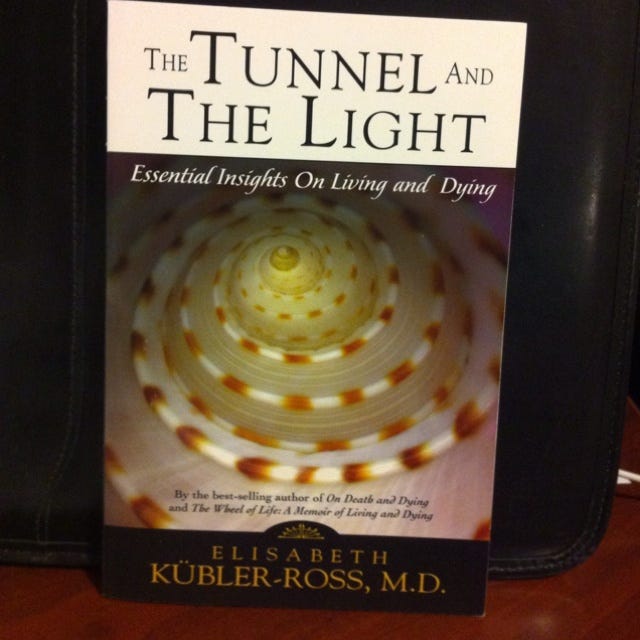The Tunnel and the Light: Essential Insights on Living and Dying
by Elisabeth Kübler-Ross
Elisabeth Kübler-Ross, a renowned Swiss-American psychiatrist and a pioneer in the study of death and dying, authored The Tunnel and the Light: Essential Insights on Living and Dying as a reflection on her decades of work with terminally ill patients. This book condenses her life’s work, blending her scientific expertise with profound spiritual insights. For those familiar with her earlier work, particularly On Death and Dying, this book serves as both a culmination and a spiritual sequel.
Overview and Structure
The book is concise, easy to read, and structured into short chapters that cover a wide array of Kübler-Ross’s thoughts and teachings on life, death, the process of dying, and, perhaps most importantly, how to live well. It includes personal anecdotes, patient stories, and reflections on her own life experiences, giving readers an intimate look into her emotional and intellectual journey.
Unlike her more academic works, The Tunnel and the Light is deeply personal and philosophical, combining her scientific understanding of death with her spiritual beliefs. Kübler-Ross expresses a conviction that life continues after death, emphasizing love, compassion, and the importance of facing mortality with grace.
Themes and Key Insights
1. Death as a Transition, Not an End
One of the core messages in The Tunnel and the Light is that death is not the end of life but a transition into another phase. Kübler-Ross draws from her years of working with patients to argue that death should not be feared but embraced as a natural part of existence. She recounts numerous stories of patients who, on the brink of death, experienced profound peace and transcendence, suggesting that death may offer a gateway to something greater.
2. The Five Stages of Grief
While not the central focus, Kübler-Ross revisits her groundbreaking theory of the five stages of grief: denial, anger, bargaining, depression, and acceptance. She highlights how these stages not only apply to those who are dying but also to the people left behind. Her insights into grief provide readers with a compassionate framework to understand their own emotions when dealing with loss.
3. Lessons from the Dying
Kübler-Ross places immense value on the lessons she learned from the dying. Many patients, in their final moments, achieved clarity about what mattered most in life—love, connection, and the present moment. She shares poignant stories of how dying individuals were able to find peace by resolving long-standing conflicts, forgiving others, or simply accepting their journey.
This perspective challenges the modern tendency to avoid or deny death, instead urging readers to confront their mortality in order to live more fully. Her work encourages embracing life’s fleetingness and using that awareness to prioritize what truly matters.
4. Love and Compassion as Central Values
A recurring theme in the book is the transformative power of love. Kübler-Ross speaks to the necessity of living with compassion, both toward others and oneself. She suggests that at the end of life, material successes, achievements, and possessions fade away, leaving only the connections we have made and the love we have shared.
5. Spirituality and Life After Death
The Tunnel and the Light leans heavily into Kübler-Ross’s belief in an afterlife, shaped by her experiences and observations with patients. She writes about near-death experiences (NDEs) and moments of spiritual clarity shared by individuals who faced death and survived temporarily. For Kübler-Ross, these encounters offered evidence that consciousness continues beyond death. Her reflections are spiritual but not dogmatic, allowing room for readers of various religious or non-religious backgrounds to contemplate her ideas.
6. Healing and Forgiveness
Another critical insight is the power of healing, particularly emotional healing, as people approach death. Kübler-Ross emphasizes that unresolved emotional pain can hinder a peaceful death, and that forgiveness, whether toward others or oneself, is essential. She recounts examples of patients who found deep healing in their final days by letting go of grudges or regrets.
Strengths of the Book
- Personal, Heartfelt Approach
One of the book’s greatest strengths is its personal tone. Kübler-Ross does not write as a detached observer but as someone deeply involved in the human experience of dying. Her compassionate voice permeates every page, making her insights feel accessible and relatable. She is candid about her own struggles and growth, which lends authenticity to her reflections.
- Simplicity and Clarity
While The Tunnel and the Light delves into deep topics, it does so in a straightforward manner. Kübler-Ross avoids academic jargon, making the book accessible to readers without a background in psychology or medicine. The short chapters make it easy to absorb key points without feeling overwhelmed, and each section contains practical wisdom that readers can immediately reflect upon.
- A Bridge Between Science and Spirituality
Kübler-Ross’s unique position as both a scientist and a spiritual thinker gives the book a balanced perspective. She does not dismiss the reality of suffering, nor does she sugarcoat the difficulties of dying. Instead, she offers a nuanced view that honors both the physical and spiritual dimensions of life and death, which many readers will find comforting and enlightening.
Criticisms
- Leaning Toward Spirituality
Some readers may find that The Tunnel and the Light leans more toward spiritual or metaphysical ideas, which could be off-putting if they are expecting a purely clinical or secular perspective. Kübler-Ross speaks confidently about the existence of an afterlife, which may not resonate with everyone, especially those who are more skeptical of spiritual beliefs.
- Repetition of Themes
As the book is more of a reflective piece, certain themes, such as love, acceptance, and the importance of facing death, are repeated multiple times throughout. While this reinforces the book’s central messages, some readers may feel that these points become redundant, particularly if they are familiar with her earlier works.
Conclusion
The Tunnel and the Light: Essential Insights on Living and Dying is a deeply moving and reflective book that offers both comfort and practical wisdom for readers contemplating mortality. Elisabeth Kübler-Ross draws on her lifetime of work with the dying to present a compassionate, insightful, and spiritual perspective on death. Her central message—that death is not something to be feared but embraced as a transition—is communicated with heartfelt clarity.
While the book’s spiritual undertones may not appeal to everyone, its reflections on love, forgiveness, and the importance of living well in the face of death make it a valuable read for anyone looking to deepen their understanding of life’s most profound experience. Whether you are a long-time admirer of Kübler-Ross or a newcomer to her work, The Tunnel and the Light provides timeless lessons on how to live and how to face death with grace and dignity.




Weirdly, I was reading a book where the writer mentioned NDEs and then your newsletter was the first thing I saw on Substack. Synchronicity? Maybe.